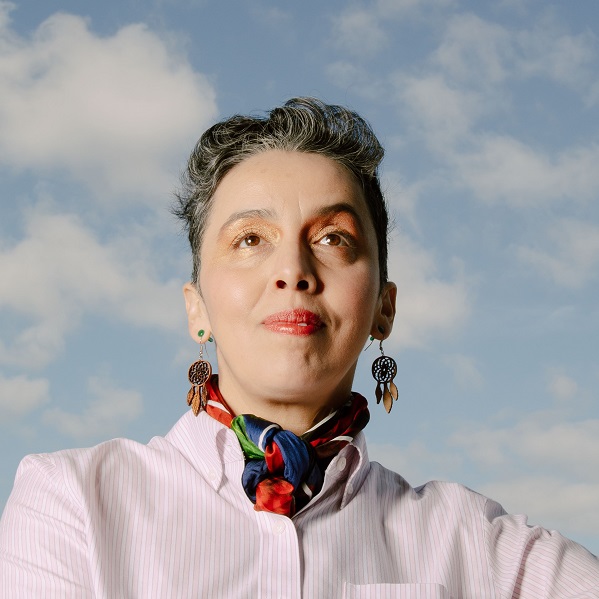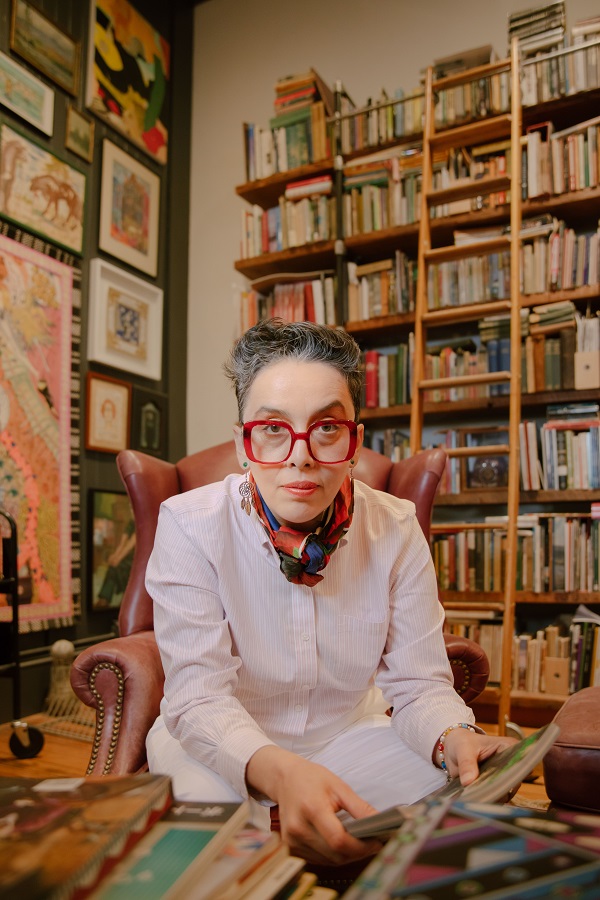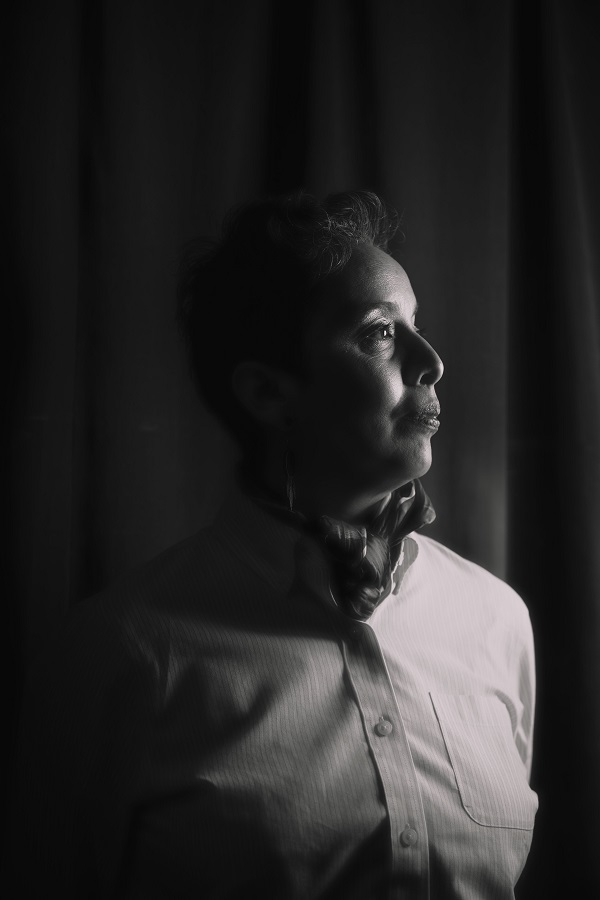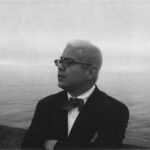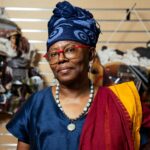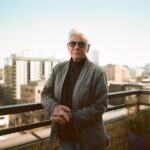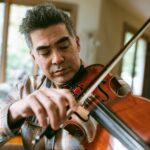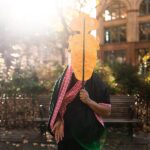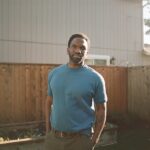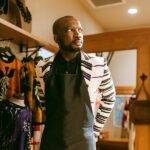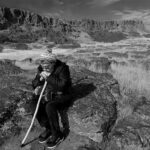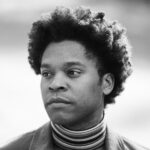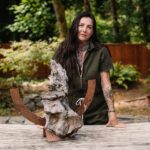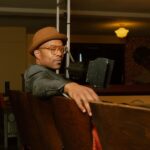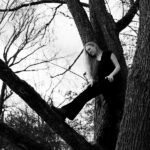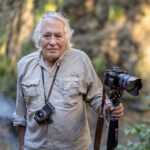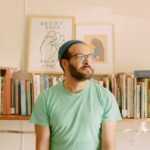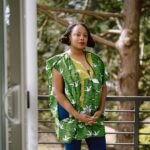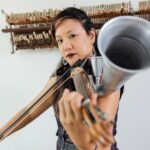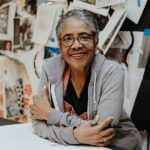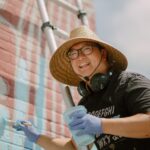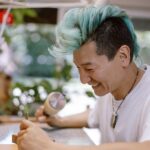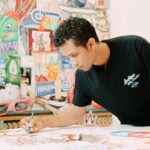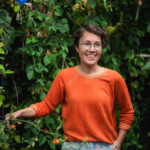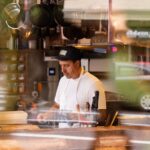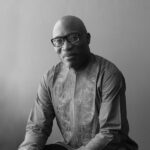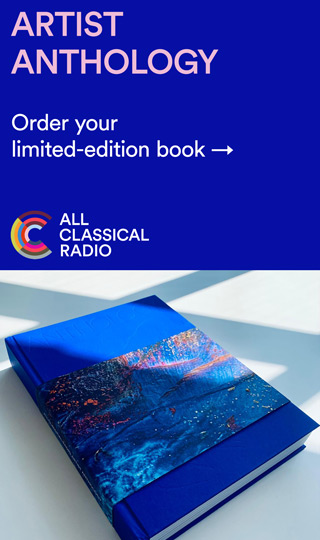A Career in Six Gifts / Una Carrera en Seis Reglas
Written by Brett Campbell; Photographed by Frankie Tresser
1. The First Guitar
When she was fifteen, a boy who had a crush on her gave Edna Vazquez a classical guitar. She wasn’t interested in the boy—even then, she sensed her romantic interests would be female—but the instrument immediately seduced her. Despite no previous experience, Vazquez was soon playing that guitar proficiently, and accompanying her already vibrant voice in song.
Vazquez grew up in 1980s Jalisco, birthplace of mariachi, Mexico’s most famous musical form. Her grandfather would play mariachi on the radio for the family, and Edna marveled at how the passionate, sentimental songs could bring even the most macho men to tears. Later, the dynamism of Mexican psychedelic rock, the way modern-day troubadours addressed social and political issues in Cuban-style trova songs, and other influences inspired Vazquez to start writing her own songs.
2. The Voice
One day, unable to afford to buy her grandmother a birthday gift, the teenage Vazquez instead learned her favorite song—and sang it for her, in an untrained voice that even then could thrill listeners with its depth and emotional power. Her grandmother, who had been a singer in her youth, began to weep for joy. She knew her granddaughter had the gift.
This gift would take Vazquez from Mexico to Oregon, to performances at the Hollywood Bowl, the Kennedy Center, Lincoln Center, and on world tours. So strong and versatile is her vocal instrument that Vazquez can credibly sing in any style she chooses. Her intense commitment makes her a transfixing stage presence, her voice soaring, then roaring, sometimes adding whistling, percussive guitar, and rapping that all sounds organic and deeply felt. The music seems to possess her whole body. But it’s about more than Vazquez alone.
“I’ve always looked up to leaders like Joan of Arc,” she explains. “Strong women who had something that they used for the good, in service to their community.”
3. The Second Guitar
When seventeen-year-old Edna later told her parents that she’d fallen in love with her best friend, who happened to be female, they shipped her off to the U.S. to live with relatives. Shortly after moving to Oregon in 1997, Vazquez was singing aloud to herself in her high school’s bathroom. A friend overheard, and asked her to sing the song as a surprise for her busy mother’s upcoming birthday party.
The mother owned an import store in Hillsboro that sold guitars, and was so impressed that she gave one to Vazquez as a present—and asked her to perform it with a mariachi band the following weekend. To her surprise, Vazquez felt completely at home fronting the band. The bandleader immediately offered her yet another gift: a permanent spot in Mariachi Los Palmeros, making Vazquez one of the Northwest’s first female mariachi singers.
4. The Dream
Vazquez played mariachi at parties and restaurants weekly, which kept her in touch with her musical roots. But over the next decade, she felt increasingly confined by mariachi’s formulaic limitations. She wanted to explore the rock sounds and trova social protest messages that had enticed her during her teen years in Mexico.
Her all-male bandmates resisted. “They wouldn’t take my ideas. They wanted me to play violin because, they said, ‘that looks good for a woman,’” she remembers. “But I really loved the guitar, and I wouldn’t play violin.”
Continue Reading
One night during this troubled stretch, Vazquez had a dream. “I was playing my guitar and smoke was coming out of the hole while I was playing,” she recalls, “and that smoke was my spirit emerging. So it felt pretty symbolic of what was going on in my head.”
The time to fly has come
To fly and dream high through the vast sky
To a brand new live episode
We must only imagine it, and it will come
(“Liberal,” by Edna Vazquez)
In 2009, Vazquez co-founded the bilingual band No Passengers with three other Latino musicians whose backgrounds ranged from jazz to classic Mexican rock. In 2010, she formed the Edna Vazquez Quintet to play the socially aware music she admired, influenced by trovas, rock, Latin rhythms, R&B, and more.
“I became an activist of my dreams,” she said from the TedX Portland stage in 2019.
Some conservative listeners called her a communist, but the irrepressible Vazquez was only reflecting her own experience as an undocumented immigrant (she gained US citizenship in 2018), and the concerns she heard in her own communities—Latinos, lesbians, working class and poor people.
“I got passionate about finding the truth and educating myself and others about the history of people like me being here,” she says. “Through my [experience] and my songs, I was talking about the community, and what better way than to do that than through music?”
5. The Crowdsourced Album
In 2010, Vazquez’s gripping performance of a song from her mother’s home region on a Spanish-language American Idol-style TV program earned acclaim, a trip to the semifinals, and offers to perform around the region and on television. Yet like many hard-to-pigeonhole indie musicians, Vazquez still struggled to make a financially sustainable career. After No Passengers’ members parted ways in 2014, she wasn’t sure how to continue. But as Vazquez later wrote in her song “Sana” (“Heal”): When the heat turns off / And it feels like everything is over / don’t feel so thrown away!
Then came the next gift. Her friends and manager encouraged her to find her own way musically—but supported by a community of fans. They crowdfunded her 2015 breakthrough album Sola Soy (I Alone), whose success enabled her to maintain her touring quintet and forge new creative paths.
“I’m never afraid to enter the unknown,” she explains. “I’ve always let my creativity guide me, and I follow it…it either works or not. It’s exciting, it’s scary, but I do it.”
Vazquez’s openness to experimentation and insistence on integrity have enabled her to explore diverse musical contexts—while defiantly remaining herself. She’s collaborated with artists like jazz-fusion stars Blue Cranes, and pianist/composer Darrell Grant. She’s finishing a novel, composing music for a friend’s musical, and soon releasing an album of Mexican folk music. “In my culture,” Vazquez says, “a woman releasing a whole folk album with her original music—it’s a big deal.”
“I just keep discovering new things about my artistry,” she adds. “It keeps me fresh and reinventing myself. Otherwise I get bored, and when you get bored as an artist, you die.”
6. Pink Martini CDs
Vazquez’s most prominent collaboration has been with Portland’s eclectic, globally influenced pop orchestra, Pink Martini. That partnership, too, began with a gift. Thomas Lauderdale, PM’s founder/pianist, heard Vazquez perform at a record store release party and was so smitten that he rounded up the band’s CD collection right then and handed it to her.
“I can’t afford to buy all these,” the still-scuffling indie artist blushed.
“I’m giving them to you,” Lauderdale said. “I want you to hear my band. I hope we can work together sometime.”
Years later, in 2017, Vazquez was backstage after playing at the Latin Grammys with Flor de Toloache, the all-star women’s mariachi band, when her phone beeped. It was Lauderdale: “Do you want to perform with Pink Martini?”
After several tours and an album featuring her vocals, “it’s a dynamic collaboration,” she says. “That’s pretty magical, that they accept me just the way I am.”
Happily, so does her family. The audience for that 2019 TedX Talk included Vazquez’s mother. “We’ve transcended all of our issues as a family,” she says. “When I embraced who I was, everything fell into place for everybody. We all learned that we want to be united, and to learn from our experiences—because if that struggle hadn’t happened, I wouldn’t be here doing what I do. We’re all connected.” Edna Vazquez’s gift keeps on giving.

